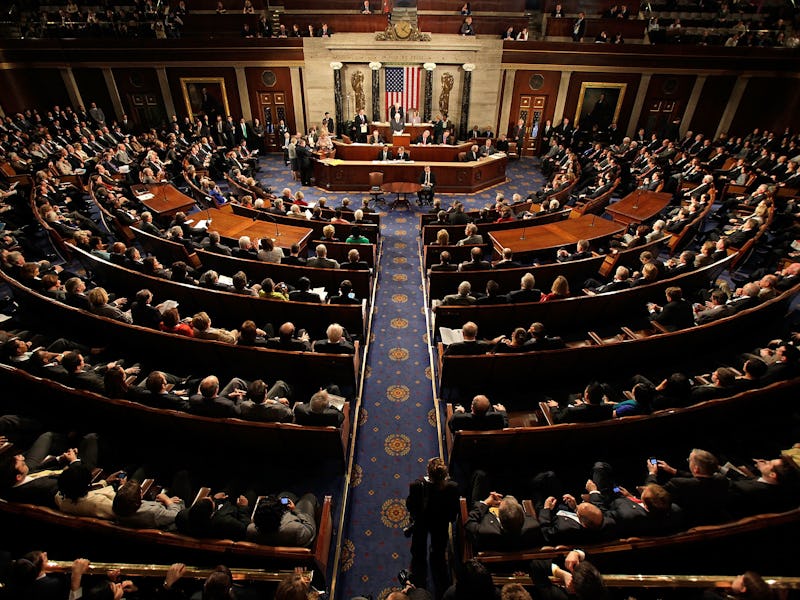Faithless Electors Won't Stop Trump, but Congress Can Stop the Electoral College
By invoking an arcane procedure, members of Congress can throw one last wrench in the works.

Donald Trump’s ascension to the presidency is all but certain. The popular vote, even if it favors Hillary Clinton, is ultimately meaningless and faithless electors. The internet’s favorite thing for the last week, essentially represents a lost cause. For those Americans who oppose Trump, there is no clear path forward. There is, however, one remaining procedural roadblock that could be erected. Senators and representatives from states that voted for Trump could use an arcane law to commandeer electors. It would not be the first time that happened.
The Electoral College is a complicated institution. The process by which it votes for, and selects a president, is elaborate and full of little intricacies. The details relevant at this moment concern how the federal government tallies electors’ vote, and declares a winner.
As is stipulated in the Constitution, physical, paper copies of the states’ certificates of vote are transported via the mail from their respective state conventions to the president of the Senate (the sitting Vice President). When they arrive at the Capitol, the votes are stored alphabetically in two special, wooden boxes to await the counting. Once all the votes have arrived, a joint session of Congress convenes to tally the votes. This process sees them entered into the public record, and makes the results official. After all the votes are counted, and assuming one candidate has earned a majority (270 or more), the Vice President declares the winner. Simple enough, right?
The answer is usually yes. But there’s a way that just a few of Congresspeople can turn it into a ten-car pileup on a major highway.
During the process of counting the votes, a Congressperson from a given state can submit an objection to their own state’s vote. The objection must be submitted in writing to the Vice President. In order for it to be considered, it must bear the signature of at least one senator and one representative from the state. If the objection meets those requirements, the joint session is suspended as each house convenes to discuss and vote on the objection. A majority vote in both houses can result in the votes from that state being disqualified and removed from the final tally.
As mentioned previously, this action has only ever been successful once, in 1872. That year, the votes from Louisiana and Arkansas were disqualified. Objections were raised during both the 2000 and 2004 elections, though neither was sustained.
The big unknown, then, is the grounds on which such an objection could be leveled. It’s tough to say, because the standards for disqualifying states from the final vote count are muddy. Looking again, back to 1872, Edward Foley, author of Ballot Battles: The History of Disputed Elections in the United States, writes that the votes in Louisiana and Arkansas were “…plagued by fraud, intimidation, and violence…” An objection on those grounds is possible in 2016, given the recent conflicts around the Voting Rights Act and voter ID laws, but it’s one that’s unlikely to succeed in a Republican-controlled House of Representatives.
More probable would be an objection based on Hillary Clinton’s now unprecedented lead in the popular vote. Nothing about the outcome of this election contradicts the law, but in this case, the law might not have to be the deciding factor. Since it’s Congress that ultimately chooses whether or not to sustain the objection, the reasoning behind the complaint just has to be good enough to convince a majority of the members of Congress. Senators and representatives from states that went for Trump could claim that, because the electors from these states are going against the overall will of the people, their votes should be disregarded. It would be a very tough sell, but it’s the approach that has the most potential for legitimacy.
This situation—what amounts to a congressional revolt against Trump—would be dramatic, especially given that if enough votes were disqualified to bring Trump below 270, Hillary Clinton still wouldn’t have a majority. It would then fall to the House and Senate to decide the president and vice president, respectively. With a Republican majority in the Senate and a Republican majority in the House, it’s impossible to predict what that selection process could look like.
Ultimately, it’s improbable that this maneuver will happen. It’s the longest of long shots, and it would be an electoral shake-up, the likes of which has never been seen before. But, for Democrats who are looking for anything and everything they can throw against Trump, petitioning their Congresspeople to object during the vote count could be a final stick to jam in the spokes of his wheel.